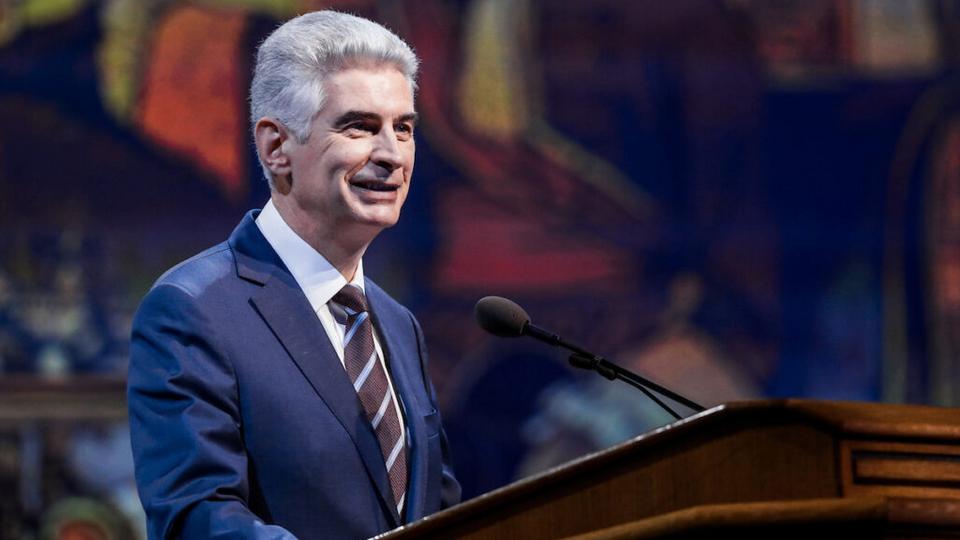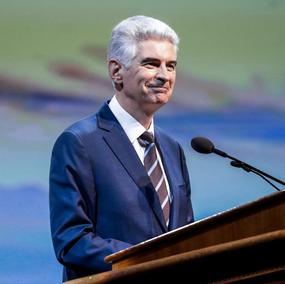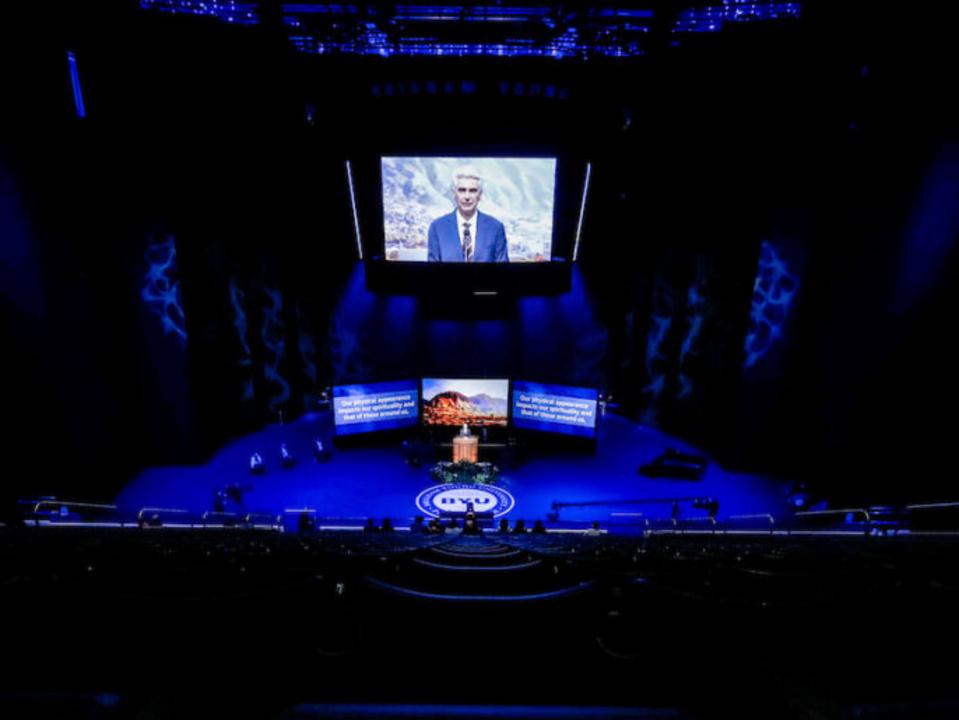
Causse BYU Devo
Bishop Gérald Caussé of the Presiding Bishopric speaks during a BYU devotional in Provo, Utah, on Tuesday, October 13, 2020. Photo by Madeline Mortensen, BYU Photo; courtesy of Church News.All rights reserved.This story appears here courtesy of TheChurchNews.com. It is not for use by other media.
By Megan McKellar Gibson, Church News
In the fairytale “Beauty and the Beast,” a young prince is under a magical spell that traps him in the body of an ugly beast. The Beast is angry and bitter, but Belle’s arrival and influence softens his heart. This change of heart incites his transformation from a horrifying monster back to his human self.
The story’s underlying message of the connection between body and spirit is a key principle for “finding true happiness in our mortal journey and in the eternities to come,” taught Bishop Gérald Caussé, Presiding Bishop of The Church of Jesus Christ of Latter-day Saints in a Brigham Young University devotional given October 13.
There are those in the Christian world who believe that the body is inherently carnal and evil, and they consequently seek to disavow their physical natures. However, harmony between body and spirit is a core doctrine taught by The Church of Jesus Christ of Latter-day Saints.
“God and His Only Begotten Son, Jesus Christ, are both immortal and glorified beings, endowed with bodies of flesh and bones,” Bishop Caussé said. “And it is through that same condition of the perfect and everlasting union between body and spirit that we, too, can one day become exalted beings.”
He then outlined three principles that serve as guidance for building harmony between body and spirit.
1. Spirituality Influences Physical Well-Being
First, spiritual strength influences physical well-being.
“Goodness radiates a certain kind of beauty,” he observed. “Those with pure and charitable hearts have a lovely countenance that is charming, attractive and draws people to them.”
Bishop Caussé warned listeners to not give in to the beauty norms of the world. “True beauty is the result of a subtle alchemy and a delicate balance, which in large part comes from our personal inner light, rather than from esthetic or physical criteria alone,” he explained.
He shared the story of French writer Jacques Lusseyran, who as a young boy suffered an injury that left him blind. After some time, he acquired what he called a “sense of human beings.”
Jacques and his friends formed an underground resistance movement against the Nazi regime when he was 15 years old. To join the movement, one had to first meet with “the blind man.”
“Jacques would listen not so much to their words as their souls,” Bishop Caussé said.

Causse BYU Devo
Bishop Gérald Caussé of the Presiding Bishopric speaks during a BYU devotional in Provo, Utah, on Tuesday, October 13, 2020. Photo by Madeline Mortensen, BYU Photo; courtesy of Church News.All rights reserved.The members of the movement were eventually arrested and sent to a concentration camp. Of his time in the concentration camp, Jacques wrote that he had “not a single evil memory of those 330 days of extreme wretchedness. I was carried by a hand, … covered by a wing. … I [became] free to help others. … I could show them how to go about holding on to life, … turn them toward the flow of light and joy, which had grown so abundant in me.”
Bishop Caussé taught that like Jacques, it is possible to “find within ourselves the spiritual resources needed to develop and magnify our physical abilities.”
By strengthening your inner light, “you will develop an inward beauty that radiates in your outward appearance, improves your physical well-being, invigorates your natural senses and makes you a happier person,” he said.
2. Physical Appearance Impacts Spirituality
The second guiding principle of building harmony between body and spirit is that physical appearance impacts spirituality.
“The manner in which we take care of our bodies, the way in which we dress and how we behave — all have a significant influence on our personal spirituality and thus impact those around us,” Bishop Caussé said.
He taught the importance of physical appearance by using the words of Paul: “Know ye not that your body is the temple of the Holy Ghost which is in you. … Therefore glorify God in your body, and in your spirit, which are God’s” (1 Corinthians 6:19-20).
Shawn, a former ministering brother to Bishop Caussé’s family, grew up in a family of Church members who were less active and almost never attended church meetings during his youth. As a student at the University of Utah, he worked part time cleaning windows across from the Salt Lake Temple. As he worked, he observed the appearance and countenances of those who left the temple.
“Often, he asked himself what they were doing inside the temple that made them so joyful when they came out,” Bishop Caussé recounted.
He soon left his “carefree lifestyle of a worldly young man,” came back to the Church and decided to serve a full-time mission.
“When his friends ask what gave him the courage to leave his previous lifestyle, he replies without hesitation, ‘It is the Spirit that I felt when I looked at the house of the Lord and watched the dress and countenances of the people who came out of it,’” Bishop Caussé said.

Causse BYU Devo
Bishop Gérald Caussé of the Presiding Bishopric speaks during a BYU devotional in Provo, Utah, on Tuesday, October 13, 2020. Photo by Madeline Mortensen, BYU Photo; courtesy of Church News.All rights reserved.3. The Lord Recognizes Both Temporal and Spiritual Principles
The last guiding principle that he outlined was that the Lord recognizes the importance of both temporal and spiritual principles.
“Church teachings include many commandments and principles that are both spiritual and temporal in nature, such as the Word of Wisdom, tithing, the law of the fast, the need for education and employment, proper handling of family finances, emergency preparedness, food storage and many others,” Bishop Caussé said.
He emphasized two important gospel principles that pertain to the way we respect our bodies: taking care of your health and being sexually pure.
“It is not simply a question of losing some fat here or there or weight lifting an additional 20 pounds to appear as buff as your roommate!” he told listeners. “The goal is to feel better and to find a temporal and spiritual equilibrium.”
Bishop Caussé echoed the words of President Boyd K. Packer, the late President of the Quorum of the Twelve Apostles, who taught that “the capacity to kindle other lives is a supernal blessing. … This power is not an incidental part of the plan of happiness. It is the key — the very key. Whether [this power is used] as the eternal laws require … will forever determine [who one] will become.”
Urging listeners to remain sexually pure, Bishop Caussé cautioned that “no immediate pleasure warrants jeopardizing the eternal promises you hold so dear; no fleeting satisfaction is worth compromising the trust placed in you by your Heavenly Father and by your current or future spouse.”
Bishop Caussé concluded his devotional message by extending an invitation to remember that one of the conditions necessary for finding happiness in this life and inheriting eternal glory is “for our spirits to take control of the physical elements of our lives so both can work in harmony to serve higher and eternal purposes.”
He promised that “in choosing virtue as the standard by which you bring into harmony your physical and spiritual inheritances, you will qualify yourselves to one day become kings and queens in the eternal kingdom prepared by our Father in Heaven and receive ‘of His fulness, and of His glory.’”

Causse BYU devo
Bishop Gérald Caussé of the Presiding Bishopric speaks during a BYU devotional in Provo, Utah, on Tuesday, October 13, 2020. Photo by Madeline Mortensen, BYU Photo; courtesy of Church News.All rights reserved.Copyright 2020 Deseret News Publishing Company